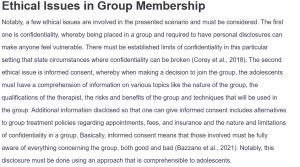Ethical Issues in Group Membership
Notably, a few ethical issues are involved in the presented scenario and must be considered. The first one is confidentiality, whereby being placed in a group and required to have personal disclosures can make anyone feel vulnerable. There must be established limits of confidentiality in this particular setting that state circumstances where confidentiality can be broken (Corey et al., 2018). The second ethical issue is informed consent, whereby when making a decision to join the group, the adolescents must have a comprehension of information on various topics like the nature of the group, the qualifications of the therapist, the risks and benefits of the group and techniques that will be used in the group. Additional information disclosed so that one can give informed consent includes alternatives to group treatment policies regarding appointments, fees, and insurance and the nature and limitations of confidentiality in a group. Basically, informed consent means that those involved must be fully aware of everything concerning the group, both good and bad (Bazzano et al., 2021). Notably, this disclosure must be done using an approach that is comprehensible to adolescents.
One strategy that can be used to help deal with the resistance is to show participants how they can benefit from participating in the group. The resistance could result from negative stereotypes associated with therapy or misinformation, and mistrust of the counselor could also lead to reservations about joining the group as well as fear of having their confidentiality abused (Corey et al., 2018). To counter this, the adolescents can be given the freedom to choose how they use their sessions, giving them the authority to decide what private information they want to disclose. Group members can be given the freedom to decide how to use the session and should be clearly informed that they have the same rights as any group members except for the right not to attend.
Some of the special issues that can arise when working with a group of involuntary members include the misuse of power or coercion; due to power dynamics, adolescents may feel disempowered and join the group without expressing their issues, which also affects their willingness to engage with the sessions. Another issue is balancing one’s job with ethical practice because the hospital expects a counselor to ensure that every adolescent attends the sessions. It can be challenging to adhere to these rules while also being ethical about the patient’s autonomy.
References
Bazzano, L. A., Durant, J., & Brantley, P. R. (2021). A modern history of informed consent and the role of key information. Ochsner Journal, 21(1), 81-85.
Corey, M. S., Corey, G., & Corey, C. (2018). Groups: Process and practice. Cengage Learning.
ORDER A PLAGIARISM-FREE PAPER HERE
We’ll write everything from scratch
Question

Ethical Issues in Group Membership
Coping with reluctant group members:
- You are employed as a counselor in the adolescent ward of a county mental health hospital. One of your duties is to lead a group for the young people, who are required to attend the sessions. You sense an unwillingness on the part of the members to come to the group. What are the ethical problems involved? How do you deal with this situation? What special ethical issues may arise when working with a group composed of involuntary members?

